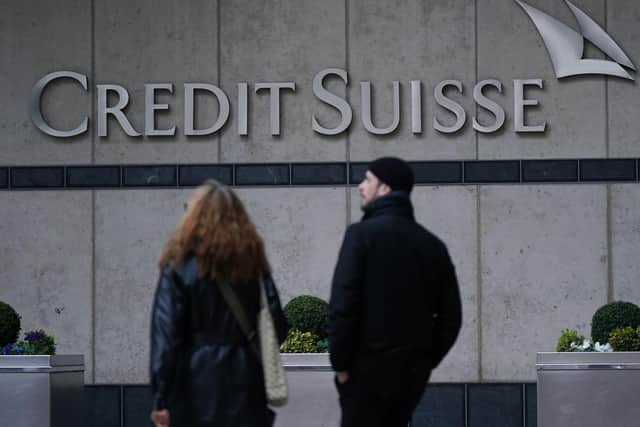Banking crisis: Will the current turmoil lead to a repeat of 2008 crash?
London’s benchmark FTSE 100 Index lost close to 2 per cent of its value in the opening hour of Monday’s session, before clawing back ground, following Sunday’s news that Swiss authorities had secured an emergency takeover deal for Credit Suisse, a Swiss lender which had been plagued with issues for some time, culminating in the announcement last month of hefty annual losses. Inevitably, banking stocks came under renewed selling pressure, despite the Bank of England insisting that banks are “safe”.
Swiss authorities announced at the weekend that UBS would acquire smaller rival Credit Suisse as regulators try to ease fears about banks following the collapse of two, relatively minor, US players. Central banks announced co-ordinated efforts to stabilise lenders, including a facility to borrow US dollars if necessary, However, investors fear banks are cracking under the strain of unexpectedly fast, large interest rate increases over the past year to cool inflation. A decision by the Bank of England on whether to raise borrowing costs again later this week is now on a knife edge.
Advertisement
Hide AdAdvertisement
Hide AdRichard Hunter, head of markets at Interactive Investor, said financial stocks had yet to find a bottom. He noted: “Markets are set for another bumpy ride this week, despite a couple of developments at the weekend designed to stem the tide of sellers among financial stocks. This now leaves markets at a potential inflection point. On the one hand, there is little question that banks are better equipped to deal with financial shockwaves than at the time of the Great Financial Crisis, due to a combination of regulatory tightening and in particular the strength of the larger banks’ balance sheets and capital cushions. By the same token, the scale of the response from central banks at the weekend acknowledges gaps in the system, which will leave many investors unwilling to revisit financial stocks until such time as the full extent of the problem is known.”
Susannah Streeter, head of money and markets at investment platform Hargreaves Lansdown, said: “It is not yet known exactly where more pain will emerge in the banking sector, but investors fear the problems are not yet over. Shares in Standard Chartered and HSBC listed in Hong Kong fell by 7 per cent after immediate relief at the Credit Suisse deal evaporated. Smaller lenders will be in focus again, particularly in the US. Bigger lenders are still considered to be much better insulated from the chill winds still blowing through the banking sector.”
Watching the events of the past week or so unfold, observers will be reminded of Lehman Brothers’ collapse and the role that historic failure played in the unfolding of the great financial crisis of 2008 - an event that led to the rescue of HBOS and the taxpayer bailout of RBS. The present banking crisis has certainly spooked investors and sent shockwaves around the world but some argue that the fallout could ultimately be beneficial for global financial markets.
Nigel Green, founder and chief executive of financial advisory firm deVere Group, said: “The events of the past week or so have sent global markets reeling as investors feared a credit crunch, and other issues, last seen during the 2008 financial crisis. Despite the shockwaves, we expect that the banking crisis could ultimately prove to be beneficial for global markets for several reasons.
“The emergency lifelines being thrown to banks by regulators and governments, among others, appear to have now halted contagion within the sector, largely containing the crisis from hitting other firms and other sectors. Central banks know that besides having to try and tame stubbornly high inflation, they also need to ensure financial stability. The events of the last week which rocked confidence will certainly give them cause for pause. The stepping back from interest rate hikes will be welcomed by investors who are concerned that overtightening now - when monetary policy time lags are notoriously long - could steer the economy into a recession.”


Credit Suisse has had problems for years but was pushed over the edge last week because of market jitters sparked by the failure of Silicon Valley Bank in the US, which was a mid-sized lender. But the rescue deal with UBS is not expected to calm markets much in the short term. Around $17 billion (£14bn) worth of Credit Suisse bonds were wiped out as part of the deal.
This week’s interest rate decisions by the US Federal Reserve and the Bank of England (BoE) are now seen as critical to providing stability for markets, and the wider economies of both nations.
James Lynch, fixed income investment manager at Aegon Asset Management, said: “The upcoming Bank of England meeting on policy rates on March 23 was always going to be a contentious decision on whether to raise by 25 basis points to 4.25 per cent or stay put at 4 per cent. One argument that has been taking place in central bank circles is over the sensitivity of the economies to higher rates and the ‘long and variable lags’ - for the past week at least, the pendulum has swung in favour of those who have a more cautious approach to monetary policy. For this reason, we think the BoE will not raise interest rates this week. We may well have seen the last increase in interest rates in this cycle.”
Comments
Want to join the conversation? Please or to comment on this article.